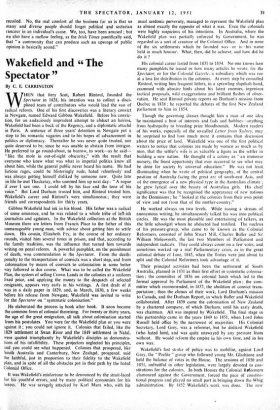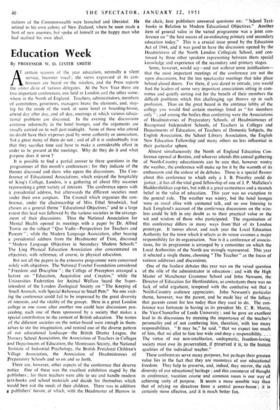Wakefield and 66 The Spectator"
By C. E. CARRINGTON
WHEN that fiery Scot, Robert Rintoul, founded the Spectator in 1828, his intention was to collect a disci- plined team of contributors who would lead the van of radical reform. One of his first discoveries was a literary convict in Newgate, named Edward Gibbon Wakefield. Before his convic- tion, for an audaciously imprudent attempt to abduct an heiress, Wakefield had been a buck of the Regency, and a diplomatic attaché in Paris. A sentence of three years' detention in Newgate put a stop to his romantic vagaries and to his hopes of advancement in politics or diplomacy. Thereafter he was never quite trusted, nor quite deserved to be, since he was unable to abstain from intrigue. He preferred to go round-about, to burrow, to work—as he said- " like the mole in out-of-sight obscurity," with the result that everyone who knew what was what in imperial politics knew all about him, while the general public never heard his name. He had furious rages, could be blisteringly rude, hated relentlessly and was always getting himself disliked by someone new. Quite late in life he met Thackeray, who summed him up next day: "A rogue if ever I saw one. I could tell by his face and the tone of his voice." But Lord Durham trusted him, and Rintoul trusted him. Wakefield's career and Rintoul's were simultaneous ; they were friends and correspondents for thirty years.
Gibbon Wakefield had ink in his blood. His father was a radical of some eminence, and he was related to a whole tribe of left-ish journalists and agitators. In the Wakefield collection at the British Museum there are letters from Francis Place to the father of this unmanageable young man, with advice about getting him to settle down. His cousin, Elizabeth Fry, in the course of her ordinary rounds, visited him several times in prison, and that, according to the family tradition, was the influence that turned him towards writing on penal reform. A powerful pamphlet, on the punishment of death, won commendation in the Spectator. From the death- penalty to the transportation of convicts was a short step, and from colonisation by means of convicts to colonisation in some better way followed in due course. What was to be called the Wakefield Plan, the system of selling Crown Lands in the colonies at a uniform fixed price, and applying the money to the despatch of selected emigrants, appears very early in his writings. A first draft of it was in a daily paper in 1829, and, in March, 1830, a few weeks before his release from Newgate, Wakefield was invited to write for the Spectator on "systematic colonisation."
He elaborated the process in book after book. It soon became the common form of colonial theorising. For twenty or thirty years, the age of the great emigration, all talk about colonisation started from his postulates. You were for the Wakefield plan or you were against it ; you could not ignore it. Colonies that failed, like the 1829 settlement at Swan River and the 1849 settlement in Natal, were quoted triumphantly by Wakefield's disciples as demonstra- tions of his infallibility. These projectors neglected his principles, and you could see what happened. Colonies that prospered, like South Australia and Canterbury, New Zealapd, prospered, said the faithful, just in proportion to their fidelity to the Wakefield plin, and in spite of all the obstacles put in their path by the hated Colonial Office.
It was Wakefield's misfortune to be denounced by the strait-laced for his youthful errors„and by many political' economists for his heresy. He was savagely. attacked by Karl Marx who, with his
usual sardonic perversity, managed to represent the Wakefield plan as almost exactly the opposite of what it was. Even the colonials were highly suspicious of his intentions. In Australia, where the Wakefield plan was partially enforced by Government, he was regarded as a sort of creature of the Colonial Office. And in none of the six settlements which he founded was--or is—his name held in much honour. What, then, did he achieve, and how did he do it ?
His colonial career lasted from 1831 to 1854. No one knows how many pamphlets he issued or how many articles he wrote, for the Spectator, or for the Colonial Gazette, a subsidiary which was run at a loss for distribution in the colonies. At every step he consulted Rintoul, writing him frequent letters, in a sprawling slapdash hand, crammed with abusive hints about his latest enemies, ingenious tactical proposals, wild exaggerations and brilliant flashes of obser- vation. He sent Rintoul private reports on Durham's mission from Quebec in 1838; he reported the debates of the first New Zealand parliament to him in 1854.
Though the governing classes thought him a man of one idea he maintained a host of interests and fads and hobbies—anything from hydropathy to breeding prize bloodhounds. Modern readers of his works, especially of the so-called Letter from Sydney. may be surprised to find how much more it contains than discussion about the price of land. Wakefield was one of the first political writers to notice that colonies are made by women as much as by men, that the settler's wife is as valuable a figure as the settler in building a new nation. He thought of a colony as "an immense nursery, the finest opportunity that ever occurred to see what may be done for society by universal education." He was not least, illuminating when he wrote of political geography, of the central, position of Australia facing the great arc of south-east Asia. and of the emergence of a new physical type in the Australian climate ; he grew lyrical over the beauty of Australian girls. His chief significance was that he recognised the appearance of new nations in the Dominions ; he "looked at the colonies from their own point of view and not from that of the mother-country."
He worked always on two levels. While issuing a stream of anonymous writing, he simultaneously talked his way into political circles. He was the most plausible and entertaining of talkers, as the little schoolgirl whom he abducted had testified. The nucleus of his pressure-group, who came to be known as the Colonial Reformers, consisted of John Stuart Mill, Charles Buller and Sir William Molesworth, the last two Members of Parliament and independent radicals. They could always count on a few votes, and sometimes worked up a real Parliamentary crisis, as in the great colonial debate of June, 1845, when the Tories were just about to split and the Colonial Reformers took advantage of it.
Their principal activities had been the settlement of South Australia, planned in 1831 as their first effort in systematic colonisa- tion; the committee of 1836 on colonial lands which led to the formal approval by Parliament of the Wakefield plan ; the com- mittee which recommended, in 1837, the abolition of convict trans- portation; then the climax of their work, Lord Durham's mission to Canada, and the Durham Report, in which Buller and Wakefield collaborated. After 1839 came the colonisation of New Zealand, by a chartered company, of which Durham, until his early death, was chairman. All was inspired by Wakefield. The final stage in this partnership came in the years 1849 to 1851, when Lord John, Russell held office by the narrowest of majorities. His Colonial, Secretary, Lord Grey, was a reformer, but he disliked Wakefield (who hated him), and was quite unswayed by any pressure from without. He would reform-the empire in his own time, and in his own way.
Wakefield's last stroke of policy was to mobilise, against Lord' Grey, the " Peelite " group who followed young Mr. Gladstone and held the balance of votes in the House. The sessions of 1850 and 1851, unfruitful in other legislation, were largely devoted to con- stitutions for the colonies. In both Houses the Colonial Reformers clamoured against the Government, forced the pace of constitu-' tional progress and played no small part in bringing down the Whig' administration. By 1852 Wakefield's work was done. The new nations of the Commonwealth were launched and liberated. He retired to his own colony of New Zealand, where he soon made a host of new enemies, but spoke of himself as the happy man who had realised his own ideal.



































 Previous page
Previous page